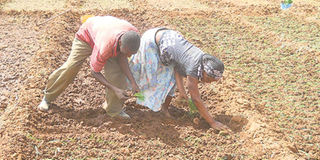Farmers taught better crop storage

What you need to know:
At least 14,000 small-scale farmers in the central zone have been introduced to post-harvest technologies to reduce the loss of crops.
Dodoma. At least 14,000 small-scale farmers in the central zone have been introduced to post-harvest technologies to reduce the loss of crops.
The initiative by the Grain Post-Harvest Loss Prevention Project (GPLP) aims at enabling farmers to meet international crop market standards.
GPLP project officer Marcel Mtei revealed yesterday to The Citizen that the farmers were missing out on international markets due to poor preservation techniques.
“Most cereals once harvested end up with a high percentage of aflatoxin due to poor storage practices,” he said.
He said under GPLP, farmers have improved ways of harvesting, storing, packaging and transporting farm produce.
He added: “Generally speaking, post harvest management practices start from the time crops are ready for harvesting and covers all stages up to delivery at markets.”
Mr Mtei said the farmers have been introduced to the advantages of protected drying cribs and have been taught the importance of drying crops on top of tarpaulin instead of, on the bare ground.
Regarding domestic storage, the farmers have been advised to use metal silos or plastic barrels.
“We have trained a number of small-scale farmers who have greatly reduced crop losses,” he noted.
He said the project is currently being implemented in Kilosa, Gairo, Kondoa, Kongwa, Mbulu, Hanang, Kishapu and Ushetu districts.
“We are working closely with local government authorities and by November, this years, we expect to reach farmers in Tabora and Singida. Statistic shows that between 25 and 40 per cent of produce in Tanzania is lost due to poor post harvest practices before reaching markets.
The project funded by the Swiss Agency for Development Cooperatives (SDC) is implemented through Helvetas Swiss Interco operation.




